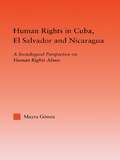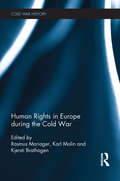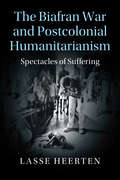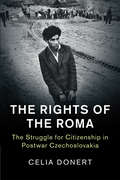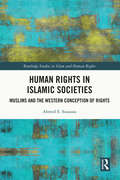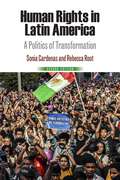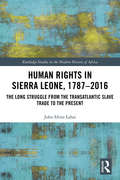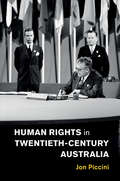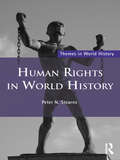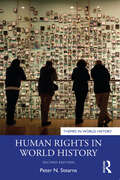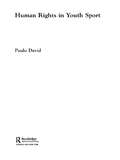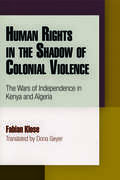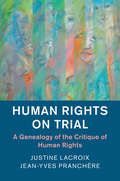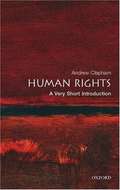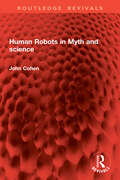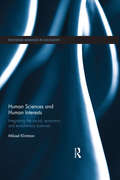- Table View
- List View
Human Rights in Cuba, El Salvador and Nicaragua: A Sociological Perspective on Human Rights Abuse (Studies in International Relations)
by Mayra GomezThis book presents a historical perspective on patterns of human rights abuse in Cuba, El Salvador and Nicaragua and incorporates international relations in to the traditional theories of state repression found within the social sciences.
Human Rights in Europe during the Cold War (Cold War History)
by Rasmus Mariager Karl Molin Kjersti BrathagenThis book provides an overview of the establishment, dispersion and effects of human rights in Europe during the Cold War. The struggle for human rights did not begin at the end of the Second World War. For centuries, political associations, religious societies and individuals had been fighting for political freedom, religious tolerance, freedom of expression, freedom of thought and the right to participate in politics. However, the world was awakened by the atrocities of the Second World War and the idea that every person should have certain perpetual and inalienable rights was set out in The Universal Declaration of Human Rights (UDHR) from 1948, which contained an enumeration of international human rights standards. Adopting an interpretative framework which pulls together universal ideas, values and principles of human rights, Human Rights in Europe during the Cold War demonstrates how conflicting interests collided when the exact meaning of human rights was established. It also discusses various approaches to the idea of imposing respect for human rights in countries where they were systematically violated and assesses the outcome of international accords on human rights, in particular the 1975 Helsinki Final Act. In conclusion, this volume proposes that human rights functioned as moral support to the opposition in repressive regimes and that this was subsequently used as a tool to further system changes. Based on new archival research, this book will be of much interest to students of Cold War studies, human rights, European history, international law and IR in general.
Human Rights in History: Cold War Germany, the Third World, and the Global Humanitarian Regime
by Young-Sun HongThis book examines competition and collaboration among Western powers, the socialist bloc, and the Third World for control over humanitarian aid programs during the Cold War. Young-sun Hong's analysis reevaluates the established parameters of German history. On the one hand, global humanitarian efforts functioned as an arena for a three-way political power struggle. On the other, they gave rise to transnational spaces that allowed for multidimensional social and cultural encounters. Hong paints an unexpected view of the global humanitarian regime: Algerian insurgents flown to East Germany for medical care, barefoot Chinese doctors in Tanzania, and West and East German doctors working together in the Congo. She also provides a rich analysis of the experiences of African trainees and Asian nurses in the two Germanys. This book brings an urgently needed historical perspective to contemporary debates on global governance, which largely concern humanitarianism, global health, south-north relationships, and global migration.
Human Rights in History: Idealism beyond Borders
by Eleanor DaveyThis is a major new account of how modern humanitarian action was shaped by transformations in the French intellectual and political landscape from the 1950s to the 1980s. Eleanor Davey reveals how radical left third-worldism was displaced by the 'sans-frontiériste' movement as the dominant way of approaching suffering in what was then called the third world. Third-worldism regarded these regions as the motor for international revolution, but revolutionary zeal disintegrated as a number of its regimes took on violent and dictatorial forms. Instead, the radical humanitarianism of the 'sans-frontiériste' movement pioneered by Médecins Sans Frontières emerged as an alternative model for international aid. Covering a period of major international upheavals and domestic change in France, Davey demonstrates the importance of memories of the Second World War in political activism and humanitarian action and underlines the powerful legacies of Cold War politics for international affairs since the fall of the Iron Curtain.
Human Rights in History: Spectacles of Suffering (Human Rights in History)
by Lasse HeertenIn the summer of 1968, audiences around the globe were shocked when newspapers and television stations confronted them with photographs of starving children in the secessionist Republic of Biafra. This global concern fundamentally changed how the Nigerian Civil War was perceived: an African civil war that had been fought for one year without fostering any substantial interest from international publics became 'Biafra' - the epitome of humanitarian crisis. Based on archival research from North America, Western Europe and Sub-Saharan Africa, this book is the first comprehensive study of the global history of the conflict. A major addition to the flourishing history of human rights and humanitarianism, it argues that the global moment 'Biafra' is closely linked to the ascendance of human rights, humanitarianism, and Holocaust memory in a postcolonial world. The conflict was a key episode for the re-structuring of the relations between the West and the Third World.
Human Rights in History: The Care of the Witness
by Michal GivoniDuring the twentieth century, witnessing grew to be not just a widespread solution for coping with political atrocities but also an intricate problem. As the personal experience of victims, soldiers, and aid workers acquired unparalleled authority as a source of moral and political truth, the capacity to generate adequate testimonies based on this experience was repeatedly called into question. Michal Givoni's book follows the trail of the problems, torments, and crises that became commingled with witnessing to genocide, disaster, and war over the course of the twentieth century. By juxtaposing episodes of reflexive witnessing to the Great War, the Jewish Holocaust, and third world emergencies, The Care of the Witness explores the shifting roles and responsibilities of witnesses in history and the contribution that the troubles of witnessing made to the ethical consolidation of the witness as the leading figure of nongovernmental politics.
Human Rights in History: The Right of Self-Determination of Peoples
by Fisch, Jörg and Mage, Anita Jörg Fisch Anita MageThe right of self-determination of peoples holds out the promise of sovereign statehood for all peoples and a domination-free international order. But it also harbors the danger of state fragmentation that can threaten international stability if claims of self-determination lead to secessions. Covering both the late eighteenth- and early nineteenth-century independence movements in the Americas and the twentieth-century decolonization worldwide, this book examines the conceptual and political history of the right of self-determination of peoples. It addresses the political contexts in which the right and concept were formulated and the practices developed to restrain its potentially anarchic character, its inception in anti-colonialism, nationalism, and the labor movement, its instrumentalization at the end of the First World War in a formidable duel that Wilson lost to Lenin, its abuse by Hitler, the path after the Second World War to its recognition as a human right in 1966, and its continuing impact after decolonization.
Human Rights in History: The Struggle for Citizenship in Postwar Czechoslovakia (Human Rights in History)
by Celia DonertThe Rights of the Roma writes Romani struggles for citizenship into the history of human rights in socialist and post-socialist Eastern Europe. If Roma have typically appeared in human rights narratives as victims, Celia Donert here draws on extensive original research in Czech and Slovak archives, sociological and ethnographic studies, and oral histories to foreground Romani activists as subjects and actors. Through a vivid social and political history of Roma in Czechoslovakia, she provides a new interpretation of the history of human rights by highlighting the role of Socialist regimes in constructing social citizenship in postwar Eastern Europe. The post-socialist human rights movement did not spring from the dissident movements of the 1970s, but rather emerged in response to the collapse of socialist citizenship after 1989. A timely study as Europe faces a major refugee crisis which raises questions about the historical roots of nationalist and xenophobic attitudes towards non-citizens.
Human Rights in Islamic Societies: Muslims and the Western Conception of Rights (Routledge Studies in Islam and Human Rights)
by Ahmed E. SouaiaiaThis book compares Islamic and Western ideas of human rights in order to ascertain which human rights, if any, can be considered universal. This is a profound topic with a rich history that is highly relevant within global politics and society today. The arguments in this book are formed by bringing William Talbott’s Which Rights Should Be Universal? (2005) and Abdulaziz Sachedina’s Islam and the Challenge of Human Rights (2014) into conversation. By bridging the gap between cultural relativists and moral universalists, this book seeks to offer a new model for the understanding of human rights. It contends that human rights abuses are outcomes of complex systems by design and/or by default. Therefore, it proposes that a rigorous systems-thinking approach will contribute to addressing the challenge of human rights. Engaging with Islamic and Western, historical and contemporary, and relativist and universalist thought, this book is a fresh take on a perennially important issue. As such, it will be a first-rate resource for any scholars working in religious studies, Islamic studies, Middle East studies, ethics, sociology, and law and religion.
Human Rights in Latin America: A Politics of Transformation (Pennsylvania Studies in Human Rights)
by Sonia Cardenas Rebecca K. RootFor decades, Latin America has been plagued by civil wars, dictatorships, torture, legacies of colonialism, racism, and inequality. The region has also experienced dramatic—if uneven—human rights improvements, shedding light on the politics of transformation. The accounts of how Latin America’s people have dealt with the persistent threats to their fundamental rights offer lessons for people around the world.Human Rights in Latin America provides a comprehensive introduction to the human rights issues facing an area that constitutes more than half of the Western Hemisphere. This second edition brings together regional case studies and thematic chapters to explore cutting-edge issues and developments in the field. From historical accounts of abuse to successful transnational campaigns and legal battles, Human Rights in Latin America explores the dynamics underlying a vast range of human rights initiatives. In addition to surveying the roles of the United States, relatives of the disappeared, and truth commissions, Sonia Cardenas and Rebecca Root cover newer ground in addressing the colonial and ideological underpinnings of human rights abuses, emerging campaigns for gender and sexuality rights, and regional dynamics relating to the International Criminal Court.Engagingly written and fully illustrated, Human Rights in Latin America fills an important niche among human rights and Latin American textbooks. Ample supplementary resources—including discussion questions, interdisciplinary reading lists, filmographies, online resources, internship opportunities, and instructor assignments—make this an especially valuable text for use in human rights courses.
Human Rights in Sierra Leone, 1787-2016: The Long Struggle from the Transatlantic Slave Trade to the Present (Routledge Studies in the Modern History of Africa)
by John Idriss LahaiThis book offers an up-to-date, comprehensive interdisciplinary analysis of the multifaceted and evolving experiences of human rights in Sierra Leone between the years 1787 and 2016. It provides a balanced coverage of the local and international conditions that frame the socio-cultural, political, and economic context of human rights: its rise and fall, and concerns for the broader engendered issues of the transatlantic slave trade, colonialism, women’s struggle for recognition, constitutional development, political independence, war, and transitional justice (as well as "contributive justice," which the author introduces to explain the consequences of the problems of the temporal nature of transitional justice, and the crisis of donor fatigue towards peacebuilding activities), local government, democracy, and constitutional reforms within Sierra Leone. While acknowledging the profound challenges associated with the promotion of human rights in an environment of uncertainty, political fragility, lawlessness, and deprivation, John Idriss Lahai sheds light on the often-constructive engagement of the people of Sierra Leone with a variety of societal conditions, adverse or otherwise, to influence constitutional change, the emergent post-coflict discourse on "contributive justice," and acceptable human rights practice. This book will be of interest to scholars in West African history, legal history, African studies, peace and conflict studies, human rights and transitional justice.
Human Rights in Twentieth-Century Australia (Human Rights in History)
by Jon PicciniThis groundbreaking study understands the 'long history' of human rights in Australia from the moment of their supposed invention in the 1940s to official incorporation into the Australian government bureaucracy in the 1980s. To do so, a wide cast of individuals, institutions and publics from across the political spectrum are surveyed, who translated global ideas into local settings and made meaning of a foreign discourse to suit local concerns and predilections. These individuals created new organisations to spread the message of human rights or found older institutions amenable to their newfound concerns, adopting rights language with a mixture of enthusiasm and opportunism. Governments, on the other hand, engaged with or ignored human rights as its shifting meanings, international currency and domestic reception ebbed and flowed. Finally, individuals understood and (re)translated human rights ideas throughout this period: writing letters, books or poems and sympathising in new, global ways.
Human Rights in World History (Themes in World History)
by Peter N. StearnsDefended by a host of passionate advocates and organizations, certain standard human rights have come to represent a quintessential component of global citizenship. There are, however, a number of societies who dissent from this orthodoxy, either in general or on particular issues, on the basis of political necessity, cultural tradition, or group interest. Human Rights in World History takes a global historical perspective to examine the emergence of this dilemma and its constituent concepts. Beginning with premodern features compatible with a human rights approach, including religious doctrines and natural rights ideas, it goes on to describe the rise of the first modern-style human rights statements, associated with the Enlightenment and contemporary antislavery and revolutionary fervor. Along the way, it explores ongoing contrasts in the liberal approach, between sincere commitments to human rights and a recurrent sense that certain types of people had to be denied common rights because of their perceived backwardness and need to be "civilized". These contrasts find clear echo in later years with the contradictions between the pursuit of human rights goals and the spread of Western imperialism. By the second half of the 20th century, human rights frameworks had become absorbed into key global institutions and conventions, and their arguments had expanded to embrace multiple new causes. In today’s postcolonial world, and with the rise of more powerful regional governments, the tension between universal human rights arguments and local opposition or backlash is more clearly delineated than ever but no closer to satisfactory resolution.
Human Rights in World History (Themes in World History)
by Peter N. StearnsThis book takes a global historical perspective to trace the rise of human rights and their global impact from the 18th century to the present. This fully updated volume examines the complex relationships between Western concepts of human rights and developments in other world regions. After providing background on relevant premodern concepts and constraints, the book explores regional interactions with human rights, the disastrous impact of imperialism and racism, the recurrent expansion of the range of rights given to those including women and children, and indigenous rights from the 19th century to the present. Major revisions for the second edition include: • a new chapter focusing on recent historical and interdisciplinary debates • a separate chapter on developments between the world wars • greater attention to causation and an expanded treatment of some regions, including Africa • an analysis of the mix of setbacks and rights expansion during the past 15 years, within the global framework. Human Rights in World History is essential reading for students, scholars, and researchers interested in modern history, human rights, and political science.
Human Rights in Youth Sport: A Critical Review of Children's Rights in Competitive Sport (Ethics and Sport)
by Paulo DavidDoes competitive sport respect children's human rights? Is intensive training child labour? Is competitive stress a form of child abuse? The human rights of children have been recognized in the 1989 UN Convention on the Rights of the Child, and ratified by 192 countries. Paulo David's work makes it clear, however, that too often competitive sport fails to recognize the value of respect for international child rights norms and standards. Human Rights in Youth Sport offers critical analysis of some very real problems within youth sport and argues that the future development of sport depends on the creation of a child-centred sport system. Areas of particular concern include issues of: over-training physical, emotional and sexual abuse doping and medical ethics education child labour accountability of governments, sports federations, coaches and parents. The text will be essential reading for anybody with an interest in the ethics of sport, youth sport, coaching and sports development.
Human Rights in the Maya Region: Global Politics, Cultural Contentions, and Moral Engagements
by Pedro Pitarch Shannon Speed Xochitl Leyva SolanoIn recent years Latin American indigenous groups have regularly deployed the discourse of human rights to legitimate their positions and pursue their goals. Perhaps nowhere is this more evident than in the Maya region of Chiapas and Guatemala, where in the last two decades indigenous social movements have been engaged in ongoing negotiations with the state, and the presence of multinational actors has brought human rights to increased prominence. In this volume, scholars and activists examine the role of human rights in the ways that states relate to their populations, analyze conceptualizations and appropriations of human rights by Mayans in specific localities, and explore the relationship between the individualist and "universal" tenets of Western-derived concepts of human rights and various Mayan cultural understandings and political subjectivities. The collection includes a reflection on the effects of truth-finding and documenting particular human rights abuses, a look at how Catholic social teaching validates the human rights claims advanced by indigenous members of a diocese in Chiapas, and several analyses of the limitations of human rights frameworks. A Mayan intellectual seeks to bring Mayan culture into dialogue with western feminist notions of women's rights, while another contributor critiques the translation of the United Nations Declaration of Human Rights into Tzeltal, an indigenous language in Chiapas. Taken together, the essays reveal a broad array of rights-related practices and interpretations among the Mayan population, demonstrating that global-local-state interactions are complex and diverse even within a geographically limited area. So too are the goals of indigenous groups, which vary from social reconstruction and healing following years of violence to the creation of an indigenous autonomy that challenges the tenets of neoliberalism. Contributors: Robert M. Carmack, Stener Ekern, Christine Kovic, Xochitl Leyva Solano, Julin Lpez Garca, Irma Otzoy, Pedro Pitarch, lvaro Reyes, Victoria Sanford, Rachel Sieder, Shannon Speed, Rodolfo Stavenhagen, David Stoll, Richard Ashby Wilson
Human Rights in the Middle East
by Mahmood MonshipouriExploring the most formidable human rights challenges facing the Middle East - the rights of women, minorities, migrant workers, and those of various sexual orientations, and the rights of all people to engage in civil disobedience - this volume addresses the extent to which dynamics surrounding human rights conditions in the region conform to or diverge from such dynamics in other parts of the world. Offering wide-ranging and rich analyses, the contributors to this volume argue that for human rights to be effectively enforced, they must be locally justified and achieved. The 2011 Arab revolts demonstrate that the people of the region can shape the condition of human rights in their societies.
Human Rights in the Shadow of Colonial Violence: The Wars of Independence in Kenya and Algeria (Pennsylvania Studies in Human Rights)
by Fabian KloseHuman Rights in the Shadow of Colonial Violence explores the relationship between the human rights movement emerging after 1945 and the increasing violence of decolonization. Based on material previously inaccessible in the archives of the International Committee of the Red Cross and the United Nations Human Rights Commission, this comparative study uses the Mau Mau War (1952-1956) and the Algerian War (1954-1962) to examine the policies of two major imperial powers, Britain and France. Historian Fabian Klose considers the significance of declared states of emergency, counterinsurgency strategy, and the significance of humanitarian international law in both conflicts.Klose's findings from these previously confidential archives reveal the escalating violence and oppressive tactics used by the British and French military during these anticolonial conflicts in North and East Africa, where Western powers that promoted human rights in other areas of the world were opposed to the growing global acceptance of freedom, equality, self-determination, and other postwar ideals. Practices such as collective punishment, torture, and extrajudicial killings did lasting damage to international human rights efforts until the end of decolonization.Clearly argued and meticulously researched, Human Rights in the Shadow of Colonial Violence demonstrates the mutually impacting histories of international human rights and decolonization, expanding our understanding of political violence in human rights discourse.
Human Rights on Trial: A Genealogy Of The Critique Of Human Rights (Human Rights In History Ser.)
by Justine Lacroix Jean-Yves PranchèreThe first systematic analysis of the arguments made against human rights from the French Revolution to the present day. Through the writings of Edmund Burke, Jeremy Bentham, Auguste Comte, Louis de Bonald, Joseph de Maistre, Karl Marx, Carl Schmitt and Hannah Arendt, the authors explore the divergences and convergences between these 'classical' arguments against human rights and the contemporary critiques made both in Anglo-American and French political philosophy. Human Rights on Trial is unique in its marriage of history of ideas with normative theory, and its integration of British/North American and continental debates on human rights. It offers a powerful rebuttal of the dominant belief in a sharp division between human rights today and the rights of man proclaimed at the end of the eighteenth century. It also offers a strong framework for a democratic defence of human rights.
Human Rights: A Very Short Introduction
by Andrew ClaphamFrom the controversial incarceration of prisoners at Guantanamo Bay, to the brutal ethnic cleansing being practiced in Darfur, to the widespread denial of equal rights to women in many areas of the world, human rights violations are a constant presence in the news and in our lives. Taking an international perspective, and focusing on highly topical issues such as torture, arbitrary detention, privacy, health, and discrimination, this Very Short Introduction will help readers to understand for themselves the controversies and complexities behind this vitally relevant issue. Looking at the philosophical justification for rights, the historical origins of human rights and how they are formed in law, Andrew Clapham explains what our human rights actually are, what they might be, and where the human rights movement is heading.
Human Rights: An Anthropological Reader
by Mark GoodaleThis innovative reader brings together key works that demonstrate the important and unique contributions anthropologists have made to the understanding and practice of human rights over the last 60 years. Draws on a range of intellectual and methodological approaches to reveal both the ambiguities and potential of the postwar human rights project. Brings together essays by both contemporary luminaries and seminal figures to provide a rich introduction to the subject. Supplemented with selected international human rights documents and links to websites on human rights.
Human Robots in Myth and science (Routledge Revivals)
by John CohenFirst published in 1966, in Human Robots in Myth and Science, the author traces the idea of the robot from antiquity until the present day (1960s) and sketches the lines of its likely development in the future. Modern science, like science fiction, is deeply concerned with the idea of a robot or self-regulating artifact which operates without human aid. Ultra rapid computers, pilotless planes, and automated factories straight away come to mind, but there are numberless other automatic devices.As John Cohen probes this exciting theme it becomes increasingly clear that the notion of a robot has had far reaching repercussions in the history of science, philosophy and literature and in the growth of industry. In his analysis of the motives of robot makers throughout the ages, the author distinguishes the impulse which challenges the gods themselves from the merely utilitarian urge. There is a vast difference between the age-old quest for technical skill and the desire to wrest from the gods the secret of making a man. The topic is treated historically, beginning with Biblical, Egyptian, Greek and other antique robots and their significance and followed by a description of the ‘man-made men’ of medieval science, alchemy and fiction. The theory of robots come into its own in the seventeenth century and its application, in craftsmanship in industry, in the eighteenth century. It is only in the recent past however, that the world of robots has begun to flourish in an ever-growing scale. In the age of AI, this historical reference work is a must read for scholars and researchers of history, philosophy and literature.
Human Sacrifice in Ancient Greece
by Dennis D. HughesNumerous ancient texts describe human sacrifices and other forms of ritual killing: in 480 BC Themistocles sacrifices three Persian captives to Dionysus; human scapegoats called pharmakoi are expelled yearly from Greek cities, and according to some authors they are killed; Locrin girls are hunted down and slain by the Trojans; on Mt Lykaion children are sacrificed and consumed by the worshippers; and many other texts report human sacrifices performed regularly in the cult of the gods or during emergencies such as war and plague. Archaeologists have frequently proposed human sacrifice as an explanation for their discoveries: from Minoan Crete children's bones with knife-cut marks, the skeleton of a youth lying on a platform with a bronze blade resting on his chest, skeletons, sometimes bound, in the dromoi of Mycenaean and Cypriot chamber tombs; and dual man-woman burials, where it is suggested that the woman was slain or took her own life at the man's funeral. If the archaeologists' interpretations and the claims in the ancient sources are accepted, they present a bloody and violent picture of the religious life of the ancient Greeks, from the Bronze Age well into historical times. But the author expresses caution. In many cases alternative, if less sensational, explanations of the archaeological are possible; and it can often be shown that human sacrifices in the literary texts are mythical or that late authors confused mythical details with actual practices.Whether the evidence is accepted or not, this study offers a fascinating glimpse into the religious thought of the ancient Greeks and into changing modern conceptions of their religious behaviour.
Human Sciences and Human Interests: Integrating the Social, Economic, and Evolutionary Sciences (Routledge Advances in Sociology)
by Mikael KlintmanWithin the disciplines of social, economic, and evolutionary science, a proud ignorance can often be found of the other areas’ approaches. This text provides a novel intellectual basis for breaking this trend. Certainly, Human Sciences and Human Interests aspires to open a broad debate about what scholars in the different human sciences assume, imply or explicitly claim with regard to human interests. Mikael Klintman draws the reader to the core of human sciences - how they conceive human interests, as well as how interests embedded within each discipline relate to its claims and recommendations. Moreover, by comparing theories as well as concrete examples of research on health and environment through the lenses of social, economic and evolutionary sciences, Klintman outlines an integrative framework for how human interests could be better analysed across all human sciences. This fast-paced and modern contribution to the field is a necessary tool for developing any human scientist’s ability to address multidimensional problems within a rapidly changing society. Avoiding dogmatic reasoning, this interdisciplinary text offers new insights and will be especially relevant to scholars and advanced students within the aforementioned disciplines, as well as those within the fields of social work, social policy, political science and other neighbouring disciplines.
Human Sciences and Human Interests: Integrating the Social, Economic, and Evolutionary Sciences (Routledge Advances in Sociology)
by Mikael KlintmanWithin the disciplines of social, economic, and evolutionary science, a proud ignorance can often be found of the other areas’ approaches. This text provides a novel intellectual basis for breaking this trend. Certainly, Human Sciences and Human Interests aspires to open a broad debate about what scholars in the different human sciences assume, imply or explicitly claim with regard to human interests.Mikael Klintman draws the reader to the core of human sciences - how they conceive human interests, as well as how interests embedded within each discipline relate to its claims and recommendations. Moreover, by comparing theories as well as concrete examples of research on health and environment through the lenses of social, economic and evolutionary sciences, Klintman outlines an integrative framework for how human interests could be better analysed across all human sciences.This fast-paced and modern contribution to the field is a necessary tool for developing any human scientist’s ability to address multidimensional problems within a rapidly changing society. Avoiding dogmatic reasoning, this interdisciplinary text offers new insights and will be especially relevant to scholars and advanced students within the aforementioned disciplines, as well as those within the fields of social work, social policy, political science and other neighbouring disciplines.
